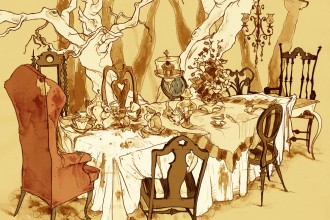Cocaine Nights
-JG Ballard
Agatha Christie would surely have enjoyed the opening chapters of JG Ballard’s Cocaine Nights: a tranquil Spanish resort is shaken when five residents die in an apparently motiveless fire — a fire which the local club manager admits to starting. No one believes he can possibly be guilty, so his brother (the novel’s narrator) flies out to investigate… So far, so conventional. Christie would be less likely to enjoy the casual violence that follows — the discovery of a graphic porn film starring one of the residents who died in the fire, the psychiatrist who inveigles his young female patients into sleeping with him, the ultimate suggestion that crime is a necessary antidote to boredom and meaninglessness.
Ballard’s novels often carry more than a hint of the academic essay: Cocaine Nights asks what happens when the Bakhtinian carnival is taken to cruel extremes. Tennis coach Bobby Crawford is, in many ways, the novel’s antihero: the narrator comes to see him as ‘some kind of saint.’ Imagine the murderous Raskolnikov transported to the Costa del Sol: Crawford , too, subscribes to the idea that ‘great men’ can live outside the law, and the notion that crime can be utilised as ‘a means to an end.’ In this case, that end is the rejuvenation of tired coastal communities in which lives are left to drift away in a void free of change, free of ambition and free of meaning.
As ever, Ballard’s argument is complex, with the narrator essentially playing Devil’s Advocate and challenging lazy assumptions about the desirability of a life devoid of incident. Crawford aims to transform the sleepy resorts one by one, escalating from petty crimes (graffiti on garage doors, small-scale burglaries) up to drug trafficking and, ultimately, murder. His rationale is as follows:
‘The process takes time. The crime wave continues [until] rage and anger are not enough. You’re forced to rethink yourself on every level, like primitive man confronting a hostile universe behind every tree and rock. You’re aware of time, chance, the resources of your own imagination. Then someone mugs the woman next door, so you team up with the outraged husband. Crime and vandalism are everywhere. You have to rise above these mindless thugs and the oafish world they inhabit. Insecurity forces you to cherish whatever moral strengths you have, just as political prisoners memorize Dostoyevsky’s House of the Dead, the dying play Bach and rediscover their faith, parents mourning a dead child do voluntary work at a hospice.’
The narrator, increasingly swayed by Crawford’s argument, summarises: ‘We realize time is finite and take nothing for granted any more. . .’
The idea that crime is necessary to transform society is easy to dismiss as unpalatable, but how many of those values are shared by political protestors? All over the world, people have been taking to the streets believing that acts of violence against their oppressors can be justified. The revellers in Bakhtin’s carnival are there to challenge authority, and challenges to authority are (history seems to teach us) rarely peaceful.  Is the idea of the ‘freedom fighter’ paradoxical?
To some extent, these are the questions posed by Cocaine Nights. The narrator comes to see Bobby Crawford as a saintly psychopath; given his ability to fashion ‘new worlds’ out of nothing, to appear ceaselessly creative, it seems reasonable to add that Crawford is also an artist — a psychopathic artist, perhaps, but an artist nevertheless.
It is hard to deny the link between aestheticism and transgression. A century before Ballard, Victor Hugo suggested that crime could function as a ‘coup d’état from below’; Humbert Humbert assures us, in the opening chapter of Lolita, that ‘you can always count on a murderer for a fancy prose style.’ Reviewing No Country For Old Men, in which the most compelling character is the psychopathic Anton Chigurh, Adam Mars-Jones wrote that ‘Aestheticism is frightening because it offers no guide to conduct; people can find anything beautiful.’ Crimes, too, can be works of art, as the narrator of Cocaine Nights quickly begins to believe.
Eventually, Bobby Crawford takes his ‘crime wave’ one step too far and is defeated — Crawford may have lost the battle, but criminality seems to have won the war: the only way of ending his ‘crime wave’ is to commit one of the most brutal murders in the entire book.
Ballard’s novels always bear a second reading (with the possible exception of Crash, where, for many readers, once through will perhaps be more than enough), and provoke a torrent of questions. Sometimes, these are questions without answers, or with ambiguous resolutions — while there is undoubtedly some truth in Crawford’s criticisms of indolent resort life, no reader could accept his unique ‘solution’ at face value. Cocaine Nights is compelling precisely because it manages to slip into the gap between the two halves of the argument, between question and answer.




